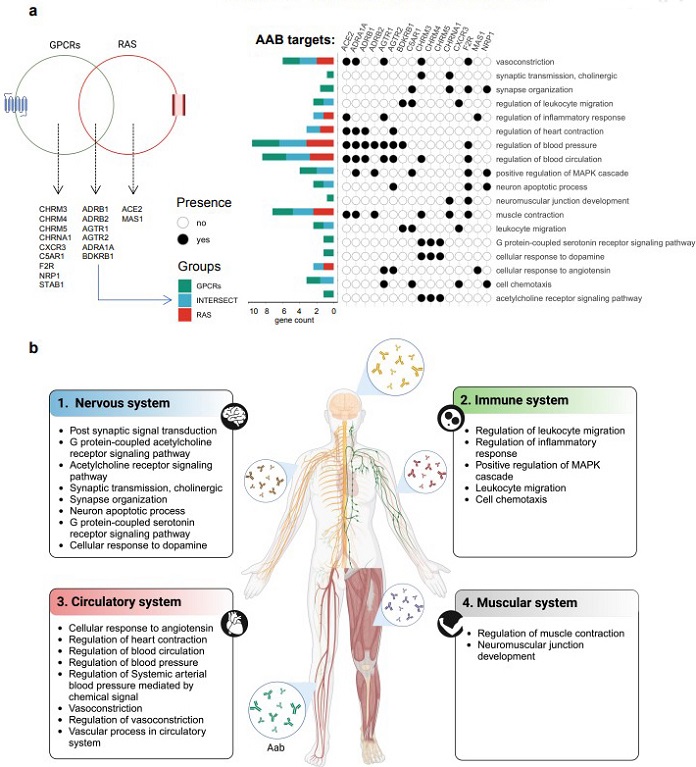Study Shows Insights Of Nuanced Interactions Between Autoantibodies And Specific COVID-19 Symptoms With Anti-AGTR1 Antibodies Playing A Key Role
Nikhi Prasad Fact checked by:Thailand Medical News Team Apr 11, 2024 1 year, 9 months, 2 weeks, 2 days, 22 hours, 48 minutes ago
COVID-19 News: The coronavirus disease 2019 (COVID-19) has baffled researchers with its wide array of symptoms, ranging from mild to severe manifestations. Despite significant strides in understanding the virus, the factors contributing to this symptom variability remain elusive. In a groundbreaking study conducted at the University of Sao Paulo (USP) that also involved researchers from the United States Israel and Germany, researchers delved into the intricate interplay between specific autoantibodies (AABs), particularly those targeting G protein-coupled receptors (GPCRs) and renin-angiotensin system (RAS)-related molecules, and the diverse clinical manifestations of COVID-19. This study covered in this
COVID-19 News report sought to unravel the potential association between these AABs and key COVID-19 symptoms, shedding light on novel insights into the disease's pathophysiology.
 Study Shows Insights Of Nuanced Interactions Between Autoantibodies And Specific COVID-19 Symptoms With Anti-AGTR1 Antibodies Playing A Key Role. Biological processes linked to antibody targets. a) The Venn diagram shows the AAB targetsbelongingto either the GPCR or RAS group. Only gene sets present in significant pathways according to the FDR are shown. Additionally, the graphic on the left exhibits the enriched biological processes (BPs) associated withtheseAAB targets, and b) the different systems to which these BPs are linked.
AABs and Symptom Correlation: Hierarchical Clustering Analysis
Study Shows Insights Of Nuanced Interactions Between Autoantibodies And Specific COVID-19 Symptoms With Anti-AGTR1 Antibodies Playing A Key Role. Biological processes linked to antibody targets. a) The Venn diagram shows the AAB targetsbelongingto either the GPCR or RAS group. Only gene sets present in significant pathways according to the FDR are shown. Additionally, the graphic on the left exhibits the enriched biological processes (BPs) associated withtheseAAB targets, and b) the different systems to which these BPs are linked.
AABs and Symptom Correlation: Hierarchical Clustering Analysis
The study commenced with a cross-sectional analysis employing hierarchical clustering to explore the relationship between AAB levels and prevalent COVID-19 symptoms. Notably, certain AABs exhibited robust correlations with specific symptoms such as fever, muscle ache, anosmia, and dysgeusia, which emerged as significant predictors of disease severity. For instance, AABs targeting CHRM5 and CXCR3 were strongly linked to fever, while those against CHRM5 and BDKRB1 correlated with muscle ache. Anosmia was predominantly associated with AABs against F2R and AGTR1, while dysgeusia showed a connection with AABs targeting BDKRB1 and AGTR1. Moreover, a rise in AAB levels was observed with the accumulation of these symptoms, with the highest levels detected in patients presenting all four predictors, highlighting the potential of AABs as predictive markers for disease severity.
Key Predictors Identified: Anti-AGTR1 Antibodies
Multinomial regression analysis identified AABs targeting AGTR1 as a key predictor for one or more of these core symptoms. Intriguingly, the study also revealed that anti-AGTR1 antibodies triggered a concentration-dependent degradation of endothelial glycocalyx (eGC), a crucial component in endothelial function. This degradation could be mitigated by the AGTR1 antagonist Losartan, suggesting a mechanistic connection between eGC degradation, COVID-19 symptoms, and rheumatic diseases like systemic sclerosis (SSc), where anti-AGTR1
AABs have been implicated.
Machine Learning Insights: Random Forest Analysis
Employing machine learning techniques such as random forest analysis, the study identified anosmia, muscle ache, fever, and dysgeusia as the most relevant symptoms defining the COVID-19 cohort. Furthermore, distinct patterns of AAB behavior were elucidated, with AABs targeting F2R, AGTR1, and NRP1 strongly associated with anosmia, while those against BDKRB1, CHRM5, AGTR2, and AGTR1 linked to muscle ache. These findings underscored the intricate relationship between specific AABs and COVID-19 symptomatology.
Stratification Analysis: AABs Levels and Symptom Severity
The study's stratification analysis based on the accumulation of COVID-19 symptoms revealed a progressive trend in AABs levels corresponding to symptom severity. Notably, individuals presenting all four relevant symptoms exhibited a clearer separation in AABs levels compared to those with fewer symptoms, indicating the potential of AABs as markers for disease severity and progression.
Functional Effects of Anti-AGTR1 Antibodies
Further investigations delved into the functional effects of anti-AGTR1 antibodies on eGC, showing concentration-dependent reductions in eGC height and increases in stiffness. Importantly, treatment with Losartan alongside anti-AGTR1 antibodies reversed eGC degradation, highlighting potential therapeutic avenues in mitigating COVID-19-related endothelial dysfunction.
Discussion and Implications
The comprehensive analysis presented in this study provides crucial insights into the nuanced interactions between AABs and specific COVID-19 symptoms. These findings not only deepen our understanding of COVID-19 pathophysiology but also pave the way for potential therapeutic interventions targeting AABs. The study's implications extend to the realms of predictive medicine, where AAB profiling could aid in disease prognosis and management.
In conclusion, this study bridges the gap between AABs, particularly anti-AGTR1 antibodies, and COVID-19 symptomatology, offering a paradigm shift in our understanding of the disease's heterogeneity and severity. Future research endeavors will undoubtedly build upon these findings, unraveling further intricacies in the immune response to COVID-19 and opening avenues for targeted therapeutic strategies.
The study findings were published on a preprint server and are currently being peer reviewed.
https://www.medrxiv.org/content/10.1101/2024.04.05.24305287v1
For the latest
COVID-19 News, keep on logging to Thailand Medical News.
